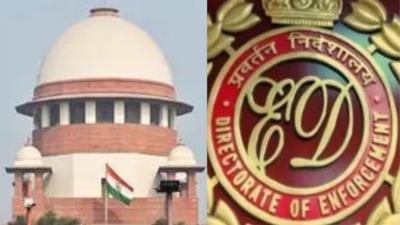NEW DELHI: Deploring Enforcement Directorate‘s high-handedness for interrogating ex-IAS officer Anil Tuteja for the whole night and showing his arrest at 4am in the Chhattisgarh liquor scam, Supreme Court Friday termed conduct of the investigators “terrible”.
Though a bench of Justices Abhay S Oka and Augustine George Masih said improper conduct of agency officials would not be grounds to quash the arrest which was challenged by Tuteja, it flagged its concern in its order and said it was “disturbing”. Court allowed Tuteja to withdraw his petition against arrest from SC and seek bail before the trial court.
“We must record a very disturbing feature of the case. The petitioner on April 20, 2024, at around 4.30pm was sitting in ACB office in Raipur. Firstly, he was served summons directing him to appear before ED at 12pm. Another summons was served while he was in the ACB office calling upon him to appear before the ED at 5.30pm. Thereafter, he was taken to ED office in a van. He was questioned by ED all night and was shown as arrested at 4am,” court said in its order.
Appearing for Tuteja, senior advocate Abhishek Manu Singhvi said SC had previously quashed the prosecution complaint filed by ED in ECIR on April 8. He said ED, three days later, registered a new ECIR based on the same set of facts and material and told the court that Tuteja’s arrest was illegal as there was no need or necessity to take him into custody.
Additional solicitor general S V Raju, appearing for the agency, agreed that the officers went overboard in the case and told the court that remedial measures had been taken to ensure that such incidents were not repeated and the agency had issued an internal circular to its officers. As per the circular, statements of accused and witnesses are to be recorded during office hours, while late-night interrogations are to be avoided, except in exceptional circumstances.
On the previous hearing, the bench had raised concern over the way PMLA was being implemented and made it clear that high-handedness in action against accused in violation of fundamental rights will not be allowed.
